지난해 11월 15일부터 12월 31일까지 실시된 ‘2024 Presidential Greatness Project Expert Survey’에서 미국 역사상 최고의 대통령으로 링컨이, 최악의 대통령으로 트럼프가 선정됐다.
이번 순위는 휴스턴대의 Brandon Rottinghaus 교수와 코스트럴 캐롤라이나대의 Justin S. Vaughn 교수가 전문가 525명에게 설문을 보내 그 중에서 회신한 154명 응답지를 분석한 결과에 따른 것이다.
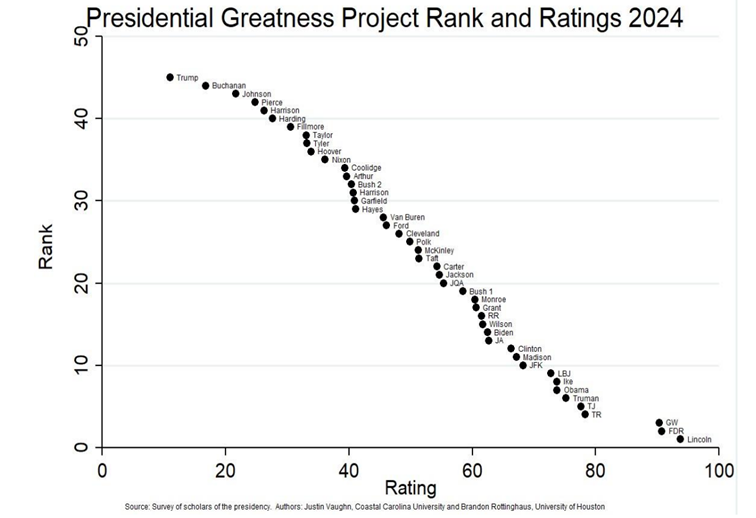
이 조사에는 대통령학에 관한 전문가들의 가장 중심적인 단체인 미국정치학회 행정부섹션과 전직 대통령 관련자들이 참여했다.
점수 기준은 100점은 위대한 대통령, 50점은 평균적 대통령, 0점은 실패한 대통령으로 책정하였다. 실제 조사결과에서 90점 이상을 받은 대통령은 링컨, 루스벨트, 워싱턴이었고, 나머지 대통령들은 80점 이하로 나타나 최상위권 세 명과 나머지 인물들의 점수 차이가 컸다.
🇺🇸

또한 45명의 대통령 중에서 절반 가량이 50점 이하로 나타났고, 트럼프는 엽기적인 10점대를 기록했다.
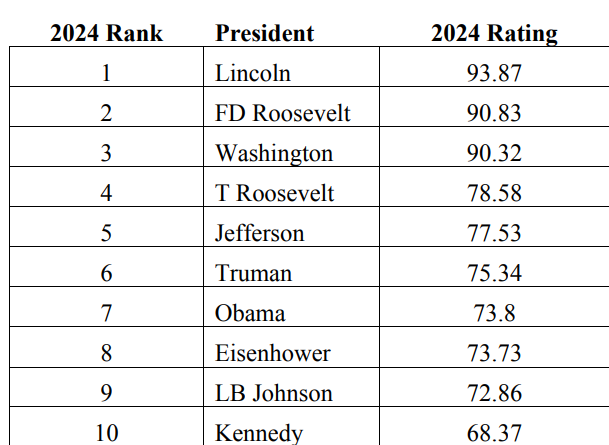
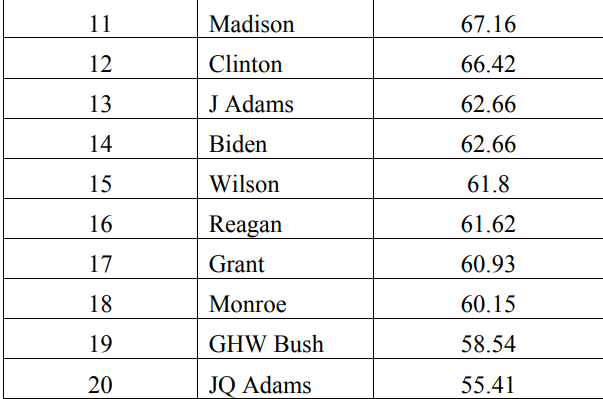
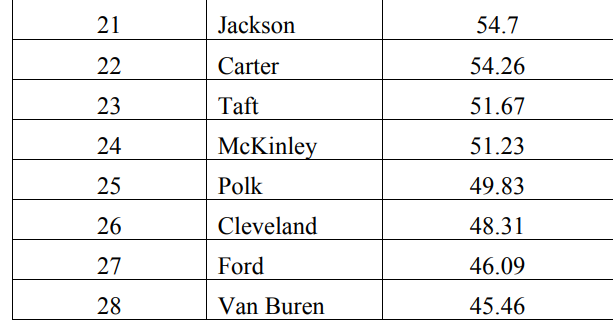

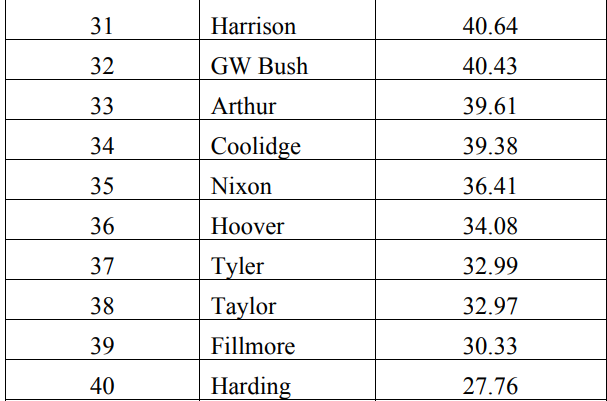

전반적으로 응답자들의 당파적 성향과 이데올로기가 순위 선정에 큰 차이를 초래하지는 않았지만, 도널드 레이건, 조지 부시, 버락 오바마, 조 바이든에 대한 평가에서는 응답자의 정치성향에 따른 양극화가 나타났다.
특히 오바마와 바이든에 대한 민주당 지지자들과 공화당 지지자들의 답변은 크게 엇갈렸다. 민주당 성향에서는 오바마가 6위로, 바이든이 13위로 선정됐다. 하지만 공화당 성향에서는 오바마가 15위로, 바이든이 30위로 밀려났다.
흥미로운 점은 재선에 성공했던 민주당의 빌 클린턴이 리버럴 및 중도 성향(12위)보다 우파 성향(10위)에서 좀더 많은 점수를 받았다는 것이다.
초당파적 대통령 : 워싱턴, 아이젠하워, 링컨, 루스벨트
평가에서 정치적 양극화가 상대적으로 낮게 나타난 초당파적 대통령으로는 워싱턴, 아이젠하워, 링컨, 트루먼, 루스벨트(프랭클린), 케네디, 몬로, 포드, 루스벨트(테디), 해리슨, 카터가 상위 일레븐(11)을 형성했다. 이들은 재임기에 초당파적 리더십을 발휘했다기 보다 후대에서 초당파적인 평가를 받고 있다.
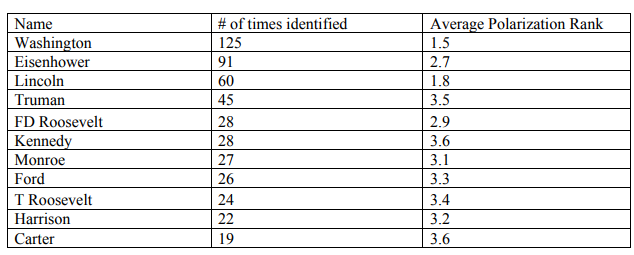
전체 순위에서는 노예해방을 이룬 에이브러햄 링컨이 1위, 최초의 흑인 대통령 오바마가 7위를 기록했다. 바이든 현 대통령은 14위로 중상위권에 속했지만, 전임 대통령 트럼프는 역대 45명 중에서 최하위인 45위를 기록했다.
또한 공화당 및 보수 성향은 초대 대통령인 조지 워싱턴을 제1의 대통령으로 손꼽았지만, 민주당 성향과 중도 및 무당파 성향은 그를 두 번째 혹은 세 번째 순위에 놓았다.
트럼프의 기록적인 악평은 응답자들의 당파적 성향을 망라한 것으로, 그는 공화당 및 우파 성향의 응답자들에서도 최악의 점수를 받았다.


이와 관련해서 트럼프 행정부의 앨리사 파라 그리핀 전 백악관 전략소통국장을 비롯해 세라 매튜스 전 공보담당 부비서관, 캐시디 허친슨 전 보좌관은 공동인터뷰를 통해 트럼프의 재집권에 대해 미국 민주주의의 종언이 될 것이라고 경고한 바 있다.
일부 전문가들은 만약 바이든이 트럼프의 재집권을 저지하고 강력한 리더십을 발휘할 경우에는 역사가들에 의해 링컨, 프랭클린 루스벨트, 워싱턴 등과 함께 가장 위대한 대통령의 반열에 오를 수 있을 것이라고 주장한다.
NPI(Northwest Progress Institute) 창립자인 민주당 활동가 빌뇌브(Andrew Villeneuve)가 이번 조사와 관련해 ‘The Cascadia Advocate’에 기고한 글에 담긴 역대 대통령 약평은 현대의 공화당 대통령들을 낮게 평가하는 경향이 있지만 참고할 만하다.
그는 트럼프 전 대통령에 대한 평가를 COVID-19 대응 실패, 법과 정치적 규범을 무시한 국정운영의 타락상, 무책임한 부유세 감세 등으로 집약했다.
미국 역대 대통령의 대표적 업적에 한국과 관련된 경우도 있다.
트루먼 업적으로 한국전쟁 참전, 아이젠하워 업적으로 한국전쟁 휴전을 들었다.
< 미국 역대 대통령의 공과에 대한 약평 >(빌뇌브)
Abraham Lincoln — Emancipated Black Americans in bondage and saved the Union by defeating the Confederate rebellion with a “Team of Rivals” cabinet that brought together Democrats and Republicans.
Franklin D. Roosevelt — Rescued the nation from the Great Depression, created Social Security, helped allies fighting fascism, and led America to victory through much of World War II in multiple theaters.
George Washington — Oversaw the successful development of the first presidential administration in history and set a long-followed two-term precedent while ably managing the new country’s foreign relations.
Theodore Roosevelt — Protected many majestic and wild places for future generations, negotiated an end to Russo-Japanese war, broke up bad trusts, and significantly improved the safety of food and medicine.
Lyndon B. Johnson — Strengthened America with Medicare, the Civil Rights Act, Voting Rights Act, and the Great Society, but sadly also deepened America’s destructive entanglement in Vietnam.
Harry S. Truman — Led the country out of World War II and worked to turn enemies into allies with the Marshall Plan, while also standing up to communism around the world with the Berlin Airlift and defense of Korea.
Thomas Jefferson — Prohibited the slave trade, fought the Barbary pirates, peacefully acquired the Louisiana Territory and sent Lewis and Clark to explore it, but also implemented the costly Embargo Act.
John F. Kennedy — Established the Peace Corps and the successful Apollo moon landing program, averted catastrophe by peacefully resolving the Cuban Missile Crisis, signed the first nuclear weapons treaty.
Dwight D. Eisenhower — Negotiated an armistice in Korea that remains in effect today, enforced court orders to integrate schools, developed the Interstate Highway system, but covertly orchestrated several coups abroad.
Joe Biden — Oversaw America’s recovery from COVID-19, worked with Congress to invest trillions of dollars into critical infrastructure, climate action, and healthcare; diversified the federal judiciary.
Barack Obama — Got America back on its feet after the Great Recession had knocked the country down, signed the landmark Patient Protection Act, negotiated New START treaty, Paris climate accords, and JCPOA with Iran.
William Howard Taft — Secured passage of a constitutional amendment to ensure the future of the federal income tax, settled disputes with France and the U.K. through arbitration, continued Roosevelt’s antitrust campaign.
Woodrow Wilson — Signed Federal Trade Commission and Clayton Antitrust Act; reluctantly led America into World War I on the side of the victorious Allies, but failed to persuade Congress to join League of Nations.
Bill Clinton — Advanced peace in Northern Ireland and the Middle East, signed Brady Bill, and expanded EITC, but unwisely triangulated on many issues, including trade, crime, LGBTQ+ rights, and financial deregulation.
John Adams — Known for being the first to peacefully transfer power after losing the presidency, he signed the Alien and Sedition Acts, fought an undeclared war with France, and worked to build a strong U.S. Navy.
Jimmy Carter — Championed conservation and solar energy, advanced peace through the Camp David Accords, and returned the Panama Canal, but struggled to confront “stagflation” and end the Iran hostage crisis.
James Madison — Took the United States into an unnecessary war with the United Kingdom (the War of 1812) but did preside over a very effective postwar period of legislating in cooperation with the 14th Congress.
James Monroe — Perhaps best known for the Monroe Doctrine, he acquired Florida, pursued the demilitarization of the U.S.-Canadian border, negotiated the Russo-American treaty of 1924, and dealt with a panic.
Ulysses S. Grant — He effectively defended the civil rights of freed Black Americans during Reconstruction, signing a bill creating the Justice Department and fighting the Ku Klux Klan, but struggled with corruption.
Grover Cleveland — The only American so far to serve non-consecutive terms as President, he fostered Navy modernization while butting heads with Congress and failing to protect workers during a time of labor strife.
William McKinley — A proponent of the gold standard and a business sympathizer, he took America into a short war with Spain and promoted tariffs to protect domestic manufacturing prior to his assassination.
James K. Polk — Known for doing what he said he’d do, he took the country in and out of war with Mexico, created the Department of the Interior, and negotiated a settlement over Oregon country with the U.K.
Chester A. Arthur — Signed the Chinese Exclusion Act after vetoing its initial incarnation, but also championed civil service reform through the Pendleton Civil Service Reform Act of 1883 and the rebirth of the Navy.
Benjamin Harrison — Presided over the admission of six western states, including Washington, signed the Sherman Antitrust Act, and implemented the McKinley Tariff, but struggled to empower Black Americans.
John Quincy Adams — Elected by the U.S. House after the Electoral College deadlocked, he couldn’t get much done during his single term, but he supported women’s and indigenous rights and opposed slavery.
Gerald R. Ford — Unwisely pardoned Richard Nixon and ineffectively tried to combat rising inflation with gimmicks instead of good policies, but he did support the Equal Rights Amendment and advance arms control dialogue.
George H.W. Bush — Provided steady leadership when the Berlin Wall fell and signed the Americans With Disabilities Act, but also invaded Panama, intervened in the Gulf War, and struggled to address a recession.
James A. Garfield — Purged corruption in the Post Office and proposed major civil service reforms that Congress adopted in 1883 but failed to address rising economic inequality and inequity before his assassination.
Rutherford B. Hayes — Ended Reconstruction as a condition of a deal that made him President and deployed the U.S Army to break a railroad strike while also harming tribal nations with forced assimilation policies.
Andrew Jackson — Unjustly displaced thousands of Native Americans from their ancestral homes and triggered a panic by killing the Bank of the United States while facilitating the enfranchisement of “the common man.”
Martin Van Buren — Struggled to address the Panic of 1837 that was caused by his predecessor’s policies and continued oppressing Native Americans through conflicts like the Second Seminole War.
Zachary Taylor — Died in office having failed to complete a single term or achieve any major progress for the country, though he did secure ratification of the Clayton-Bulwer Treaty with the United Kingdom.
John Tyler — Though he alienated his party and became politically homeless after taking over from William Henry Harrison, he worked to stop oceanic African slave trafficking under the Webster-Ashburton Treaty.
Ronald Reagan — Responsible for Iran-contra scandal, implemented harmful economic deregulation, ineffectively responded to AIDS epidemic, but did eventually find an arms control partner in Mikhail Gorbachev.
William Henry Harrison — He hardly did anything because he was only President for a few weeks, so some scholars might argue he shouldn’t be ranked at all, but including him for completeness makes sense.
Calvin Coolidge — Supported women’s suffrage and racial equality, but his harmful “laissez-faire” economic policies set the stage for one of the worst economic calamites in modern times: the Great Depression.
Herbert Hoover — Coolidge’s successor, deservedly known for an ineffective, uncaring response to the Depression, including the refusal to provide early cash redemption of veterans’ service bonus certificates.
Andrew Johnson — Lincoln’s successor botched Reconstruction and ended up feuding with his own party in Congress, becoming the first president to find himself impeached by the House of Representatives.
Millard Fillmore — Supported the disastrous Compromise of 1850, including the Fugitive Slave Act, and emphasized anti-immigration and anti-Catholic policies after taking over from Zachary Taylor.
Warren G. Harding — Made bad personnel decisions that resulted in corruption and scandals like Teapot Dome, refused to join the League of Nations, and implemented an ineffective disarmament agreement.
Richard Nixon — Several very progressive policy achievements for a Republican president, but he perpetrated atrocities abroad with Kissinger in Southeast Asia and damaged the presidency with scandals like Watergate.
George W. Bush — Ignored intelligence suggesting al Qaeda would strike the U.S., launched unwinnable wars in Afghanistan and Iraq, cut taxes for the wealthy, and did not effectively respond when the Great Recession hit.
Franklin Pierce — Opposed the abolitionist movement, nixed the Missouri Compromise through the Kansas-Nebraska Act, enforced the immoral Fugitive Slave Act, and lost so much support that he wasn’t renominated.
James Buchanan — Backed the Supreme Court’s horrific Dred Scott decision as well as Southern scheming to admit Kansas into the Union as a slave state and failed to confront the Confederate insurrection.
Donald Trump — Failed to effectively respond to the onset of the COVID-19 pandemic, ran a horrifically corrupt regime that flouted ethics laws and violated political norms, and irresponsibly cut taxes for the wealthy.
'미중 패권경쟁 > 미 대선' 카테고리의 다른 글
| 해리스가 불러낸 주디 리, 트럼프가 불러낸 맥스 케네디 (4) | 2024.08.31 |
|---|---|
| 대선승리의 열쇠, 해리스 8개 대 트럼프 5개 (24) | 2024.07.29 |
| 카멀라 해리스의 모계혈통은 인도 타밀족 (29) | 2024.07.22 |
| 트럼프 저격 20세 백인 크룩스 : 미 대통령 저격 흑역사 (32) | 2024.07.14 |
| 미 연방대법원, 트럼프 전 대통령 면책특권 파문 (25) | 2024.07.02 |